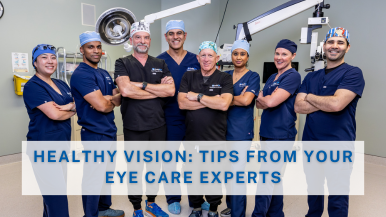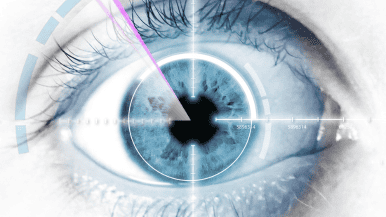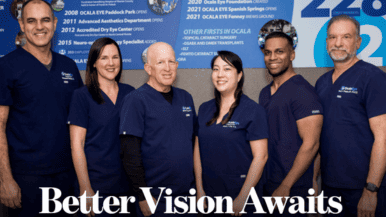 What are cataracts?
What are cataracts?- What causes cataracts?
- When should you see a doctor?
- What are the benefits of cataract surgery?
- What’s it like to have cataract surgery?
Having cataracts doesn’t always mean you have to have surgery to remove them, although each year, approximately 10 million people around the world do. Cataracts typically evolve slowly, and over time, they can negatively affect your life.
What causes cataracts? How do you know when it’s time to see your doctor? Is cataract surgery the right option for you? We have the answers that will help you better understand the condition known as cataracts and when—or if—you should have them removed.
What Are Cataracts?
Cataracts cloud the normally clear lenses of your eyes so that it’s like looking through a dirty, hazy window. As the cataract progresses and obscures your vision, it makes simple tasks, like reading a book or driving a car almost impossible.
Cataracts are a progressive disease, so early on, the obstruction to the lens of your eye may not even be noticeable. But over time, you’ll notice a darkening of your vision. Some of the typical symptoms of a progressing cataract include:
- Blurred or cloudy vision
- Colors fading or yellowing
- Difficulty seeing at night
- Double vision in one of your eyes
- Frequent upgrades to your prescription eyeglasses or contacts
- Light or glare sensitivity
- Need for progressively brighter light for reading
- Seeing halos around lights
People that have cataracts may have some or all of these symptoms. What causes cataracts to form and when is it time to see your doctor?
What Causes Cataracts?
 People over 40 can have age-related cataracts. As the proteins in the eye age, they may clump together to form cataracts. Over time, these deposits prevent the light from passing through the front of your eye, which obscures your ability to process images.
People over 40 can have age-related cataracts. As the proteins in the eye age, they may clump together to form cataracts. Over time, these deposits prevent the light from passing through the front of your eye, which obscures your ability to process images.
You may also develop a cataract from some kind of trauma to the eye. Electric shock, chemical burns, or a blunt, penetrating trauma can cause cataracts. Patients who undergo chemotherapy radiation are also at a higher risk of developing cataracts.
High blood pressure can also lead to cataracts, as well as macular degeneration and glaucoma. Individuals experiencing chronic diabetes are more prone to developing cataracts in one or both eyes. This is because the liquid that lubricates the eyes, called the aqueous humor, can develop a high level of sugar when the diabetic patient cannot control their glucose levels.
There are also lifestyle choices, such as heavy alcohol consumption or excessive smoking, that can lead to cataracts.
When Should You See a Doctor?
Anytime you have changes to your vision it’s time to see your eye doctor. Eye pain, sudden headaches, or blurry vision are all signs that is is time to make an appointment for an examination. There are generally several symptoms that signal your cataracts are progressing to the point so that you should see a doctor.
The first sign is if your vision becomes impaired. Are you squinting to see, even with your glasses or contacts? You’ll notice that seeing at night is becoming an increasing problem. Bright light may hurt your eyes, but at the same time you need an increasingly bright light to see a book or your computer. If you are over age 40 and you have one or more of these symptoms, it’s time to see your eye doctor.
Unfortunately, the effects of cataracts cannot be reversed by eye drops or medications. Surgery is ultimately the only long-term solution. You don’t have to wait until you can no longer see to have cataract surgery. If blurry vision or other symptoms are affecting the quality of your life, talk with your physician.
What Are the Benefits of Cataract Surgery?
The biggest benefit of cataract surgery is that it helps you see again. Up to 90% of patients who undergo cataract surgery have a favorable outcome. Cataract surgery can:
- Lessen your dependence on contacts or glasses
- Make your vision clearer
- Brighten the colors that you see
If you have stopped driving because of cataracts, removing them can help you to regain your independence. It can also help you to avoid falls and injuries.
Cataract surgery also helps to protect the overall health of your eyes. If you don’t seek out cataract surgery, the eyes will remain inflamed. This could increase eye pressure, which leads to a dangerous condition called glaucoma that causes blindness.
Cataract surgery can improve the quality of your life. If you have cataracts, you probably have to depend on someone else to drive you around. You may have trouble reading. Even simple tasks, such as running to the grocery store can seem insurmountable. After cataract surgery, you will feel more independent and confident as you participate in the activities that you enjoy once again.
What’s It Like to Have Cataract Surgery?
Cataract surgery takes only about an hour. During the procedure, the doctor will remove the cloudy lens and replace it with a prosthetic intraocular lens (IOL). In about 30 days, the eye will be fully healed and your vision restored. Cataract surgery is a painless procedure, and you will be under the doctor’s care until the recovery is complete.
Why should you have cataract surgery? It’s one of the safest healthcare procedures available that can restore health to your eyes. This procedure is performed in an outpatient surgical center so that you can heal comfortably at home. Many people notice improved vision immediately after surgery, but it does take a month for full vision to be restored. You should also check with your insurance carrier; generally, most plans cover at least part of the cost.
If you’re suffering from the symptoms of cataracts, please see your doctor. Ocala Eye is well-versed in providing cataract treatment. We can help you regain your sight—and your independence. Contact us today.




